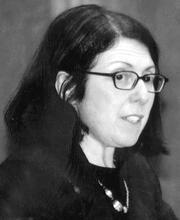Rose Dunkelman
Rose Dunkelman was an innovative and industrious Canadian Zionist leader. Born in Philadelphia in 1889, she married one of Canada’s most successful industrialists and retailers at the age of twenty-one. She rose to prominence in Toronto during World War I for her charity work. Dunkelman and her husband David both worked fervently for the Zionist cause. Dunkelman was the founder and long-time vice-president of Canadian Hadassah-WIZO and she also served as a national chair of Youth Aliyah. In 1925 she founded the Toronto Hadassah Bazaar, which raised funds for projects in Israel through donated clothing. That same year Dunkelman was named to the National Executive of the Zionist Organization of Canada. Dunkelman had six children, one of whom served in Israel’s War of Independence.
A forceful and innovative Zionist leader, Rose Dunkelman rose to prominence in Toronto during World War I for her work for veterans, Jewish war orphans and the Red Cross. Born in Philadelphia to Harry and Dora (Belkin) Miller, at the age of twenty-one she married David Dunkelman (1880–1978), who became one of Canada’s most successful industrialists and retailers. For a short time, she participated in his business activities, chiefly the Associated Clothing Manufacturers and Tip Top Tailors, a chain of stores selling moderately priced clothing across Canada.
Zionist Activity
Although wealthy and acculturated, the Dunkelmans embraced Zionism at a time when their counterparts in the United States and elsewhere generally preferred assimilation to Jewish nationalism. The pair worked in complementary ways to advance the Zionist cause. For many years, David was Canada’s largest donor to the movement, and he guaranteed bank loans which made it possible to purchase Emek Hefer in the 1920s.
Rose was a founder and long-time vice-president of Canadian Hadassah-WIZO and served as president of its Ontario region for many years. In 1925 she was named to the National Executive of the Zionist Organization of Canada of which Hadassah-WIZO was a constituent. Later, she served as national chair of Youth Lit. "ascent." A "calling up" to the Torah during its reading in the synagogue.Aliyah and was an active participant in the work of the Jewish National Fund for land reclamation in Palestine.
Dunkelman was a consummate fundraiser, but she was equally well known for her activism and willingness to strike out on new paths. She founded the Toronto Hadassah Bazaar in 1925 and thereafter ran it for many years. The Bazaar raises funds for projects in Israel through the sale of donated, mostly used, high quality clothing and other merchandise. Held at the Canadian National Exhibition grounds, the Bazaar remains at the turn of the twenty-first century a highly successful annual event. Dunkelman also originated and edited the Hadassah Cook Book.
When, in 1929, Maurice Eisendrath assumed the position of rabbi of Holy Blossom Temple, Toronto’s patrician, Reform and oldest synagogue, he also became editor of The Canadian Jewish Review. The young rabbi, who years later would head the Union of American [Reform] Hebrew Congregations, was a staunch anti-Zionist, and he used the paper and his pulpit to promote his views. Dunkelman led a group of community stalwarts in taking action to counter Eisendrath, whose ideas diverged greatly from community norms. They founded a new journal, The Jewish Standard, importing as its editor Meyer Weisgal (1894–1977), the American Zionist editor and impresario who acted as Chaim Weizmann’s right-hand man in the United States. Weisgal stayed in Toronto only about a year, but in that time he succeeded in putting the Standard on firm footing. It is still publishing in 2004, albeit after several changes of ownership and format.
Jewish Involvement & Family
In addition to her Zionist endeavors, Dunkelman took part in the activities of the Conservative synagogue to which her family belonged (now Beth Tzedec), the Lit. "study of Torah," but also the name for organizations that established religious schools, and later the specific school systems themselves, including the network of afternoon Hebrew schools in early 20th c. U.S.Talmud Torah and Hebrew Free Schools, the YM/YWHA, and the Federated Jewish Charities of Toronto. In the 1930s, together with Mattie Rotenberg and a number of others, she attempted to shore up the faltering Toronto Kehilla, which had been created to forge a united community organization. After World War II, she served on the Ontario Family Allowance Board. Dunkelman also developed a getaway destination for Jewish families named Balfour Beach along the shores of the southernmost bay of Lake Simcoe, in which her husband and uncle constructed cabins for renters. She also established a Jewish summer day camp, Camp Katonim, which is still in operation as of 2022.
The Dunkelmans had six children: Joseph, Ernest, Benjamin, Theodora, Veronica, and Zelda. Benjamin (1913–1997) served with distinction as an officer in Israel’s War of Independence. In addition to leading Operation Hiram, which secured the Galilee for Israel, he played an important role in the construction of the Burma Road, which circumvented the siege of Jerusalem, and introduced the notion of military rank. He later returned to Canada with his Israeli-born wife to head the family business, where he published his biography Dual Allegiance, describing his own story as well as his mother’s influence in igniting his Zionist calling. Fittingly, Rose Dunkelman is buried in A voluntary collective community, mainly agricultural, in which there is no private wealth and which is responsible for all the needs of its members and their families.Kibbutz Deganya Alef.
Tulchinsky, Gerald. “Rose Dunkelman.” Encyclopedia Judaica, Vol. 6 (2007): 50.
Rose, Ben. “Ben Dunkelman, hero in War of Independence, profiled on TV.” The Canada Jewish News (Toronto), Vol. 30 (March 3, 2000): 11.




